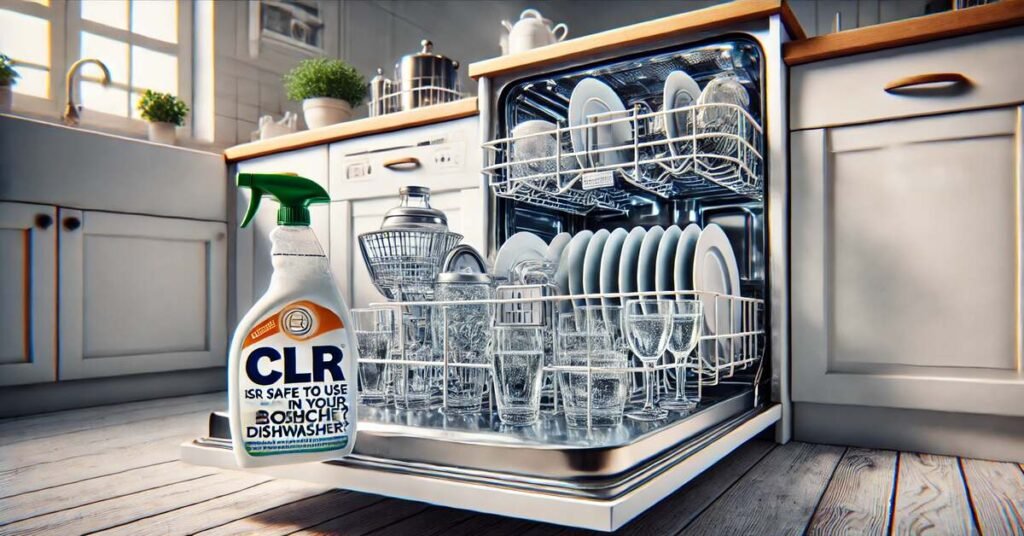Cleaning a Bosch dishwasher can be tough. This is true, especially with mineral build up or limescale. Many people use products like CLR (Calcium, Lime, and Rust remover). But, is CLR safe for your Bosch dishwasher?
In this guide, we’ll explore whether using CLR in your Bosch dishwasher is recommended and how to use it safely.
Is CLR Safe for Bosch Dishwashers?
Yes, CLR is safe for Bosch and Whirlpool dishwashers. Just use it as directed. CLR removes tough lime, calcium, and rust deposits that can build up in dishwashers over time. But, it’s crucial to use the correct amount. Too much could damage your dishwasher’s parts.
- CLR safe for Bosch dishwasher Whirlpool: CLR can clean a Whirlpool dishwasher. But, don’t overuse it.
Pro Tip: Always run an extra rinse cycle after using CLR to ensure no residue remains in your dishwasher.
How to Use CLR Safely in Dishwashers
If you’re considering using CLR to clean your Bosch dishwasher, follow these steps to ensure safe use:
- Measure the Right Amount. Too much CLR in your dishwasher can cause excessive foaming or damage its parts. Typically, you should use about 1/2 cup of CLR and dilute it with equal parts water.
- Run the Dishwasher. Pour the CLR mixture into the bottom of the dishwasher. Then, run a normal wash cycle without dishes. Make sure to skip the drying cycle.
- Rinse Cycle After the wash, run a rinse cycle. This will flush out all the CLR.
Note: Using CLR in the dishwasher foaming excessively may indicate overuse. Always measure accurately to avoid this issue.
Alternatives to CLR for Cleaning Your Dishwasher
If you’re unsure about using CLR or want to try a different option, here are a few good alternatives:
- Vinegar: Descaling your dishwasher with vinegar is an effective and natural solution. Simply add 1 cup of vinegar to the bottom of the dishwasher and run a wash cycle.
- Dishwasher Cleaner Tablets: Products specifically designed as dishwasher cleaners are also available. These tablets can remove limescale and mineral deposits. They work without CLR.
- To descale a dishwasher with vinegar, run it empty with 1–2 cups of vinegar in the bottom. It’s an eco-friendly and safe alternative to harsh chemicals.
What to Do If You Use Too Much CLR
Using too much CLR in your dishwasher can cause problems. It may foam excessively or damage internal parts. Here’s what to do if this happens:
- Stop the Cycle If you notice excessive foaming, stop the cycle immediately.
- Rinse Thoroughly. Run several rinse cycles to remove all the CLR and foam from the dishwasher.
- Check for Damage. If your dishwasher fails after using too much CLR, consult the manufacturer or a technician.
Cleaning Your Bosch Dishwasher Without CLR
There are other ways to clean your dishwasher without using CLR, including:
- How to Clean the Dishwasher Filter. Cleaning the filter is vital. It keeps your Bosch dishwasher working well. Remove the bottom rack, take out the filter, and wash it with warm, soapy water.
- Using Lime-A-Way in the Dishwasher If you prefer not to use CLR, Lime-A-Way is another option. Follow the same steps as for CLR, ensuring you rinse the dishwasher thoroughly after use.
Conclusion:
Using CLR in your Bosch dishwasher can remove calcium, lime, and rust. But, you must use it properly to avoid damage. Always measure the right amount. Then, run a rinse cycle. If you prefer a gentler method, try natural alternatives like vinegar.
Need expert help? Contact a Bosch technician for professional support!
Frequently Asked Questions
Is CLR good for dishwashers?
Yes, CLR is good for dishwashers when used correctly. It helps remove limescale, calcium, and rust, improving the dishwasher’s performance.
Is it safe to use CLR in a dishwasher?
Yes, it’s safe to use CLR in dishwashers. But, follow the manufacturer’s instructions for best results.
How do I clean the dishwasher filter?
To clean the filter, remove the bottom rack, take out the filter, and wash it with warm, soapy water.







